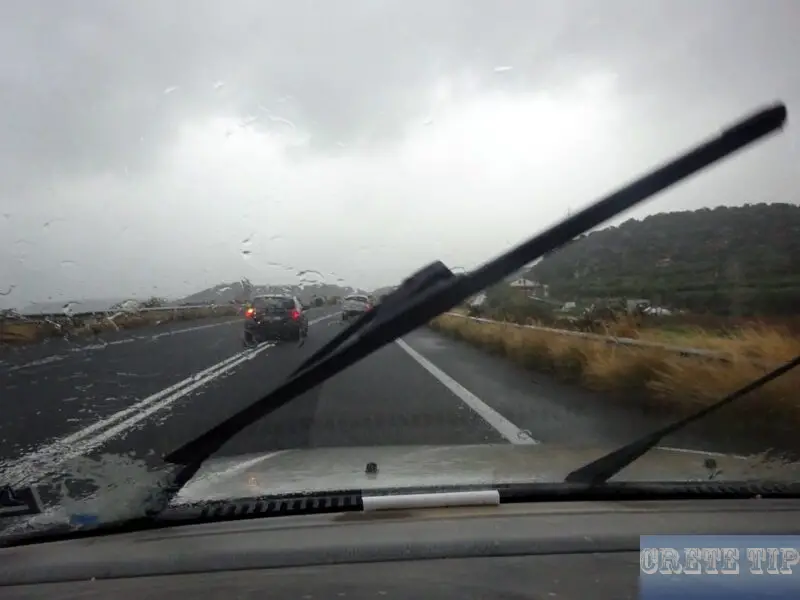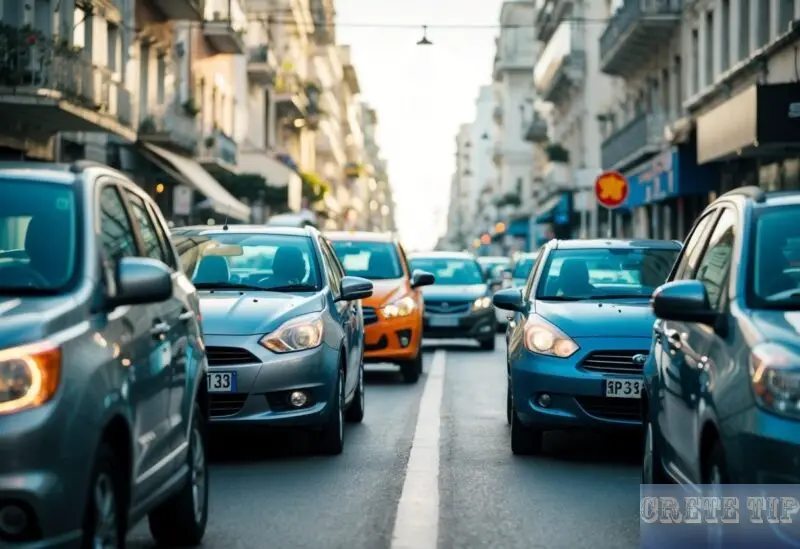Fines of up to €2,000 now threaten for traffic violations in Crete. Where can I find information about a car based on its number plate and tourist bus drivers without a driving licence?
New traffic regulations introduce fines of up to 2,000 euros
Big changes are on the way for Greece’s Code of Road Traffic Regulations, and the fines? Let’s just say they’re not messing around this time.
Drivers and road users should know: penalties can now hit a hefty 2,000 euros for certain violations.
These updates are supposed to boost road safety and make the rules stick. If you’re driving or even just living in Greece, it’s probably smart to get a handle on what’s new.
The scope of offences is wider now, so keeping up with the changes could save you from a nasty surprise. Here’s a rundown of what’s changed and why it matters.
Overview Of The New Road Traffic Code Reforms
So, the new code? It’s got stricter penalties and clearer rules, all in the name of safer streets and better compliance. Fines are going up, driver responsibilities are spelled out, and vehicle rules are getting an overhaul.
This is rolling out in phases, not all at once, so nobody’s expected to adapt overnight.
Purpose Of The Legislative Changes
The idea is to cut down on traffic accidents and deaths by making things a bit more serious for offenders. Higher fines are aimed at folks who keep breaking the rules—think speeding and driving under the influence.
There’s also an effort to sync up with EU standards and keep vulnerable people—pedestrians, cyclists—safer. Plus, the rules are catching up with newer vehicle types and tech.
Key Differences From The Previous Code
Fines are way up—now as high as €2,000 for the worst violations. The list of what counts as an offence is longer, too, from using your phone behind the wheel to parking where you shouldn’t.
There are new requirements for vehicle inspections and tougher point deductions if you keep messing up. Automated cameras and electronic monitoring are being used more to catch violators.
Previous Code |
New Code |
|---|---|
Maximum fine €700 |
Maximum fine €2,000 |
Limited offences |
Expanded offence categories |
Manual enforcement |
Enhanced automated enforcement |
Timeline For The Implementation
These changes start rolling out from July 2025. The first wave will ramp up fines and update what counts as an offence.
Things like new inspection rules and more electronic monitoring come in early 2026. There’s a review planned for 2027, so expect tweaks.
Major Fines Introduced By The New Road Traffic Code
‘Greek overtaking’ – not recommended for imitation:
The code spells out clear categories for fines. The big headline? Penalties up to €2,000 for serious stuff, and more pain for repeat offenders.
Fine Categories And Offence Types
Offences are split into minor, serious, and very serious. Minor stuff—like parking in the wrong spot or skipping your seatbelt—means fines from €40 to €100.
Serious violations, like going up to 40 km/h over the limit, will cost you €150 to €500.
Very serious offences—drunk driving, reckless moves—get you the highest fines and sometimes extra penalties. The code actually lays out what falls into each bucket, so there’s less guesswork.
Penalties Reaching €2,000
The top fines, up to €2,000, are for the most dangerous behavior. That means things like driving 70 km/h over the limit, no licence, or causing injury in an accident.
If you’re caught, you might lose your licence or even have your car impounded, not just pay up.
Penalty Escalation For Repeat Offenders
If you break the rules again within a set time, the fines go up. For example, get caught speeding twice in a year? The second fine could be 50% higher.
Habitual offenders risk longer licence suspensions and, in bad cases, losing their vehicle altogether. The idea is to finally get through to those who don’t learn the first time.
Application And Enforcement Procedures
The new system spells out how fines are calculated, how violations are tracked, and how you can dispute them. The goal is to keep things consistent—at least in theory.
How Fines Are Assessed
Fines now range from €100 to €2,000, depending on how bad the violation is and if you’ve done it before. They look at the type of offence, the impact, and whether you’re a repeat offender.
First-timers with minor issues get smaller fines, but serious or repeat cases will feel it more. It’s all about making the punishment fit the crime.
Deadlines to pay are tight, and if you miss them, expect extra charges or even legal trouble. Sometimes, cooperating with authorities or fixing the problem fast can get your fine reduced, but don’t count on it every time.
Monitoring Mechanisms And Enforcement Bodies
Enforcement is in the hands of specific government agencies—they’ve got the power to inspect, fine, and keep everyone in line. They’re using digital tools and random checks to spot violations.
There’s a mix of automated systems and good old-fashioned inspections. Hotspots and sectors with lots of past issues get more attention.
Local and national authorities have to work together, which should help with regional quirks. They also publish reports on how things are going, so you can see what’s working (or not).
Dispute Resolution And Appeals
If you think a fine is unfair, you can challenge it—usually within 30 days of getting notified. Appeals go in writing to the right tribunal.
You’ll need to gather your evidence and make your case, and an independent panel decides. Sometimes enforcement pauses while the appeal’s ongoing, unless it’s a public safety thing.
If you’re still not happy, you can take it higher, but you’ve got to stick to strict deadlines. Decisions are public, so there’s some transparency at least.
Impact On Motorists And Road Safety

With fines this high, drivers are probably going to think twice before breaking the rules. The hope is that tougher penalties will make people more careful and cut down on accidents.
Expected Changes In Driver Behaviour
Most motorists will likely get more cautious—nobody wants a €2,000 bill. Offences like speeding, dangerous moves, or ignoring signals now have real teeth.
In cities, where monitoring is tighter, you’ll probably see more people sticking to speed limits and actually stopping at crosswalks. The threat of losing your licence or paying a huge fine is hard to ignore.
Repeat offenders used to get off pretty lightly, but now? The new system is designed to make sure risky driving hurts your wallet and your licence.
Projected Effects On Accident Rates
If the models are right, stricter enforcement and bigger fines should mean fewer accidents. Other countries have seen drops in fatal and serious crashes—up to 15%—after similar changes.
This could be a big deal for secondary roads and busy city centres, where accidents have always been a headache.
Less reckless driving also means fewer emergencies, which is good news for hospitals and everyone stuck in traffic after a crash.
Legal And Social Implications
The new KOK rules are shaking things up for drivers and vehicle operators. Not everyone’s thrilled, and there’s definitely some debate about how fair or effective the changes will be.
Some drivers are worried about the steep fines—€2,000 isn’t pocket change. Others argue it’s about time for stricter rules if it means safer roads.
There’s skepticism, too: will enforcement really be fair, or will some people get away with more? Public trust depends on seeing the rules applied evenly.
Community groups are asking for better awareness campaigns, hoping to clear up confusion and prevent accidental violations.
Advice For Vehicle Owners And Operators
If you own a vehicle, now’s the time to double-check your paperwork and make sure you’re up to date. Following the new KOK is going to save you money and headaches.
Operators might want to up their game with more driver training and regular checks. It’s not just about avoiding fines—it’s about meeting your legal obligations.
Regulations can change again, so keeping an eye on updates is wise. It’s easy to get caught out if you’re not paying attention.
Resources For Further Information
Want more info? Official government websites are a solid starting point. The Ministry of Infrastructure and Transport posts updates and the actual legal texts.
Legal databases like Nomos let you dig into the details—laws, amendments, all that jazz. Handy if you need specifics.
For news and summaries, sites like ours cover traffic law changes and public reactions pretty regularly. They’re worth checking out.
Local police departments often put out bulletins or clarifications, especially about how the new rules apply in your area. Sometimes it’s just easier to call or check their website.
If you’re trying to figure out fines or how to pay them, the Traffic Police Department and the Ministry of Citizen Protection both have online resources. You’ll find FAQs and payment portals there.
Source |
Type |
Access |
|---|---|---|
Ministry of Infrastructure |
Official legislation |
|
Nomos Legal Database |
Legal texts |
|
Traffic Police Department |
Enforcement details |
Sticking with these sources should keep you up to speed on the latest rules and fines.
Who owns the car with the number plate in Greece?
The Open Car platform lets anyone check info about a car with Greek licence plates. It’s quick, free, and honestly pretty handy if you’re curious or cautious.
Just type in the licence plate number, and you’ll see details about the car’s status. The platform tells you if the vehicle’s on the road, immobilised, or even flagged as stolen.
That can save you from headaches, like accidentally buying a stolen or uninsured car. You’ll also spot insurance details, including how long the coverage lasts.
Basic details pop up too—colour, make, type—all pulled straight from official state records.
Important notes:
- No personal owner details (name, ID, etc.) show up. That’s off-limits.
- You won’t see financial info, like unpaid taxes or fees.
You can get to Open Car through the Greek government’s digital portal or just head online. It’s all about transparency, but personal info stays protected since only vehicle data is shown.
Tourist bus driver without a driving licence
The Association of Tourist Bus Owners of Crete has gone public condemning a recent incident where a driver operated without the proper professional licence. This happened at Heraklion port and has raised some pretty serious concerns about passenger safety and following the rules.
The driver was caught transporting 50 tourists illegally. The Association called it unacceptable and said it damages the reputation of professional transport in Crete.
Key points highlighted by the Association:
- The bus wasn’t registered with the Association.
- They’re committed to sticking to the law and safety standards.
- Illegal operations go against everything the Association stands for.
The Association keeps stressing the need for lawful conduct if Crete wants to offer top-notch transport. They’re urging everyone to stay alert and hold people accountable to prevent this from happening again.







